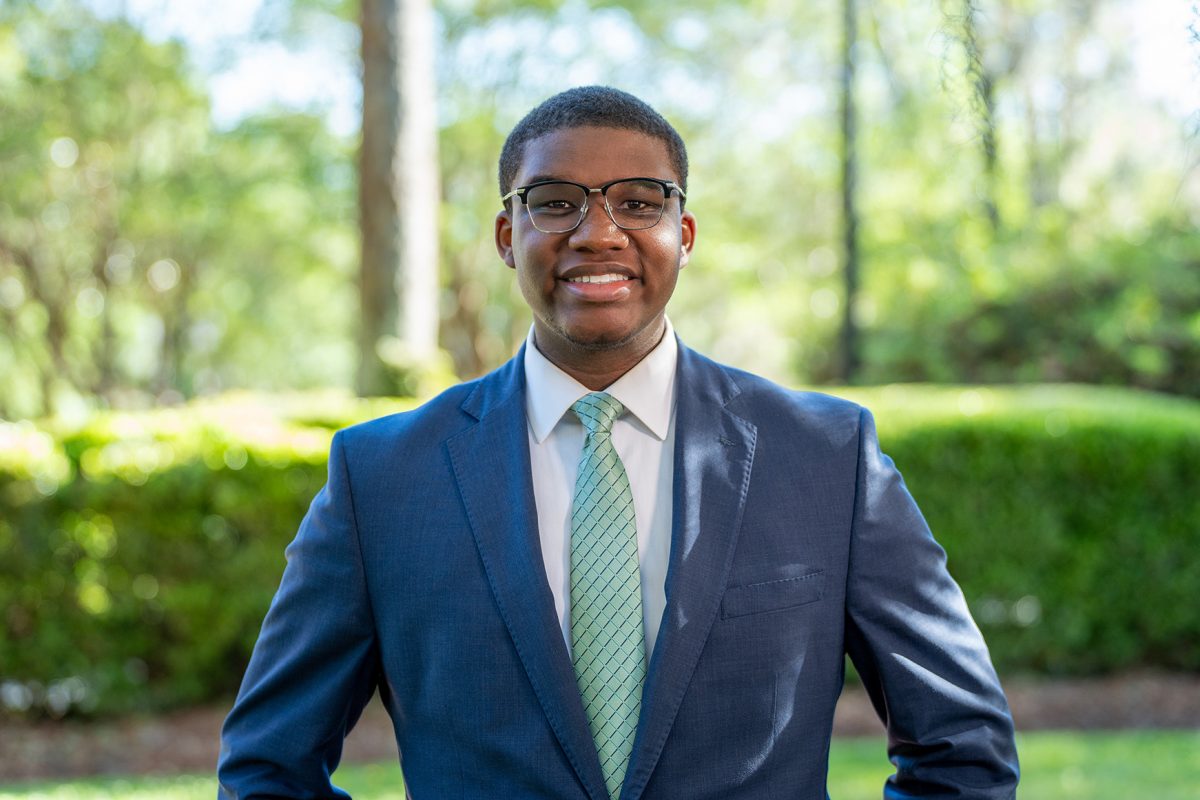
“I chose to attend Florida State University for its academic rigor and campus life, set against the backdrop of Florida's capital. ”
Fast Facts
- Reader: His two favorite books are I Know Why the Caged Bird Sings by Maya Angelou and Invisible Man by Ralph Ellison.
- Go-to campus meal: Brisket Sandwich from 4 Rivers Smokehouse
- First involvement: Union Productions/Club Downunder in the Programming Department
- Adventurous: His family and him go crabbing every summer
- Favorite study spot: The BSU House
Rodney Wells came to Florida State University because he believed it was the best place to advocate for various causes he supports. He found Tallahassee, the capital of Florida, was the ideal location for his efforts.
Throughout his time at FSU, Wells has been involved in different organizations and leadership positions. A former John Lewis Scholar, Truman Finalist and White House intern, Wells also served as the student body vice president during his junior year.
He has advocated for voting rights, literacy advancement among youth and for research on anti-lynching and other hate crimes.
Why did you choose to attend Florida State University?
I chose to attend Florida State University for its academic rigor and campus life, set against the backdrop of Florida’s capital. The university offered an environment to both explore my passions and extend my learning beyond the classroom. FSU’s location in Tallahassee opened doors to unique experiential learning opportunities. From internships in government and public service to community engagement projects, allowing me to grow through a synthesis of my education and application.
In what ways were you able to impact the community at Florida State University?
My involvement in the Student Government Association since my freshman year has been profoundly impactful. Serving as the Student Body vice president, I oversaw various identity-based agencies, bureaus, affiliated projects and the class councils. A significant part of my role was supporting these agencies (e.g., Veteran Student Union, Black Student Union, Pride Student Union) and fostering collaboration and unity among them. Previously, as the director of External Affairs in the Executive Branch, I led the Garnet and Gold Votes Commission, focusing on strategic voter engagement initiatives for the 2022 election alongside key campus stakeholders.
Another key involvement of mine has been with the Black Student Union, particularly my role as the political education chair. Being a part of the Black Student Union has and continues to be a transformative experience. This space has allowed me to deeply connect and find community on campus, embracing the rich history of Florida State University’s Black community and our shared experiences. More than that, it challenged me to introspectively delve into the principles and values that have molded my identity.
What have been your most significant academic accomplishments?
I am undertaking an Honors in the Major Project under Professor Davis Houck, focusing on the National Association for the Advancement of Colored People’s (NAACP) 1934 Anti-Lynching Campaign. This project was an extension of my work from the previous semester, where I conducted an archival study on NAACP litigator Charles Hamilton Houston through a directed independent study.
In my sophomore year, I served as a research assistant at the Hate Crime Research and Policy Institute within the College of Criminology, thanks to the Undergraduate Research Opportunity Program. There, I contributed to creating a national database for serious hate crime offenders, aiming to identify patterns and risk factors associated with such crimes.
What work have you done toward the causes you’re passionate about?
In Jacksonville, my hometown, I served on the board of directors for Literacy Pros, securing $20,000 from the Jacksonville City Council for a youth literacy billboard campaign. At FSU, I was a political action chair for the NAACP chapter and later a National Democracy Fellow, where I was invited to meet with Vice President Kamala Harris and other White House officials to advocate for enhanced voter protection rights and access nationally. In the fall of 2023, I worked as a voter protection fellow in Mississippi during the gubernatorial election, where I spearheaded legal research on voting laws and managed the state’s largest voter protection hotline, directly impacting voter support and guidance.



